Mural project aims to raise awareness of West End ‘Heroines’
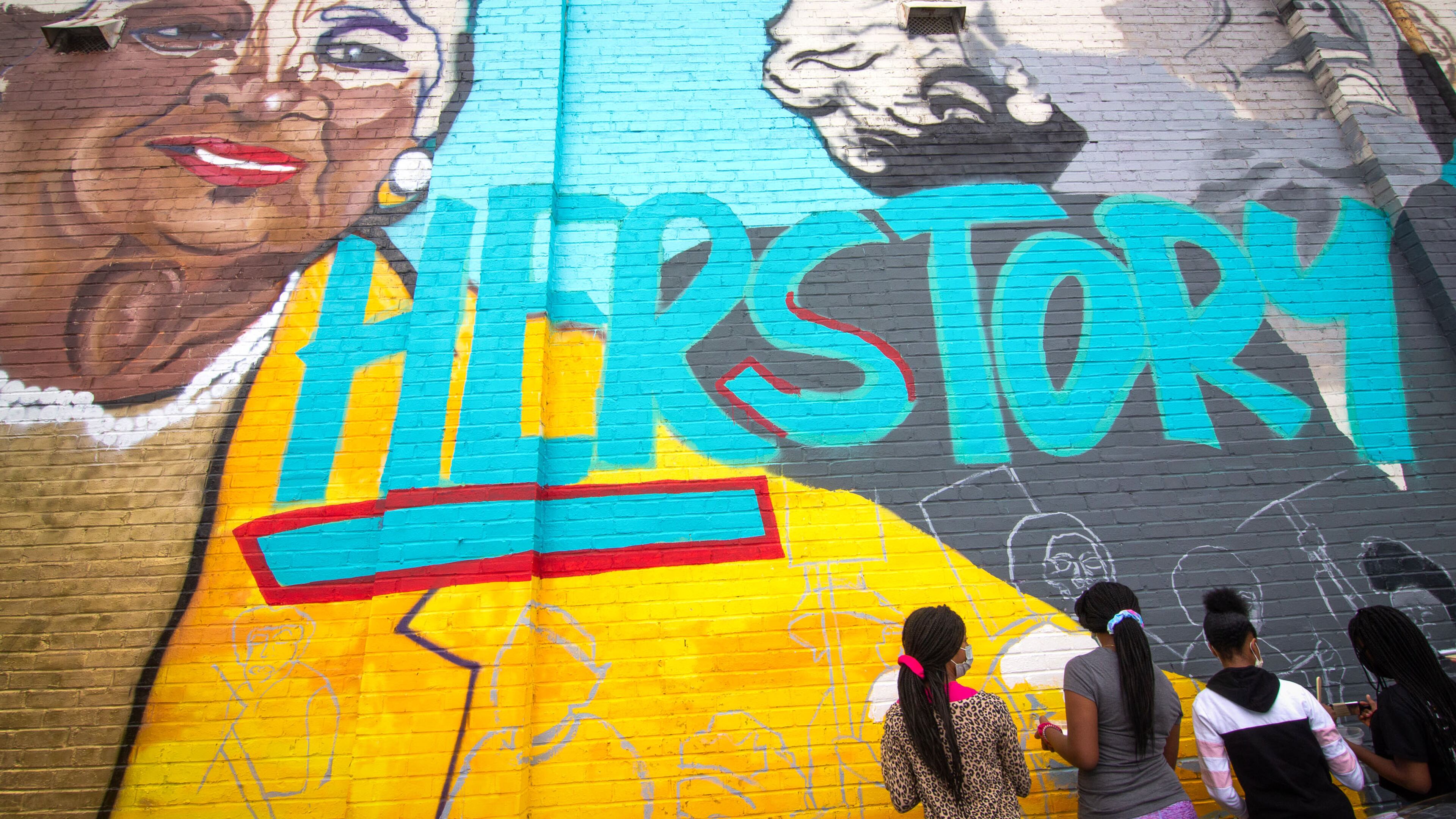
If the rain wasn’t getting in Ashley Dopson’s way, it was the taggers.
The start of Atlanta’s ninth annual Elevate public art festival was just under three weeks away. At that point, the mural Dopson designed as a festival centerpiece was little more than white outlines against a royal blue background soaring two stories above Ralph David Abernathy Boulevard in Atlanta’s West End.
Hurricane Sally’s remnants drenched the middle of September making it impossible to work outside. When Dopson and a few volunteers squeezed in a few hours of painting on dry days, a handful of young men tagged the bottom of the mural with yellow spray paint at night. Like the rains, the men were persistent. They kept coming back.
By last Saturday Dopson had long passed feelings of hurt and resignation. She knew she had to meet the deadline for Oct. 4, the festival opener. With a brush in her hand, cans of paint at her feet and a brigade of women and girls who’d come to volunteer by her side, Dopson was resolute. They would keep painting.
“We were out here until 1 o’clock in the morning the other night,” Dopson said.
The mural, “Heroine: Unsung Women Involved in Civil and Social Justice,” covers the east side of the West End Goodwill store. Nine women who built a legacy in the West End, from writers to educators to business owners, are depicted: Pearl Cleage, Ayanna Gabriel, Abiodun Henderson, Irene Dobbs Jackson, Woody Neal Pearsons, Kiyomi Rollins, Arianna Dane Sykes, Hattie Guinn Watkins and Lottie Watkins. The piece also centers the theme of Elevate this year: “Equity, Activism and Engagement,” in the historic West End. Curated by Leatrice Ellzy, executive director of Hammonds House Museum, the festival, which runs through Oct. 10, will spotlight the neighborhood’s longstanding role as a hub for Atlanta’s Black community.
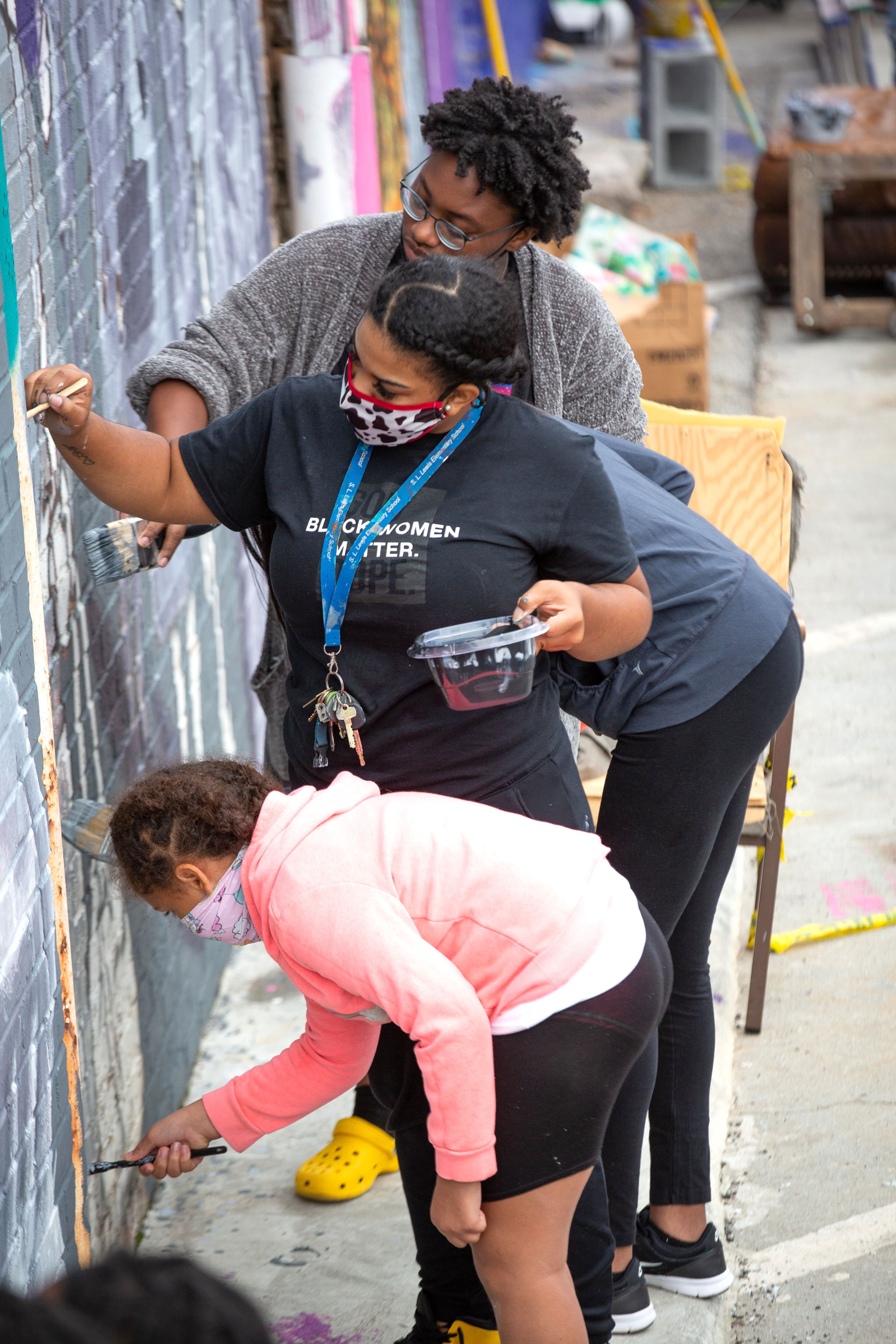
Like many festivals, much of Elevate’s programming will be virtual due to the coronavirus pandemic. The lineup is a love letter to the West End, featuring Black artists who’ve centered the neighborhood in their work, including bestselling authors Pearl Cleage and Tayari Jones, visual artist Shanequa Gay and photographer Melissa Alexander. There will be a performance by the Alvin Ailey American Dance Theater, a screening of the documentary, “John Lewis: Good Trouble,” and a voter registration drive at the West End MARTA station.
The week-long event is a reminder of what the community has been, from years of stability and prosperity to extended periods of economic decline, to what is fast becoming a gentrifier’s heaven.
“If we don’t recognize the jewel the West End is, it will be overrun by people who don’t have any knowledge of or respect for its history,” said Camille Russell Love, Atlanta cultural affairs office executive director, whose office sponsors the festival.
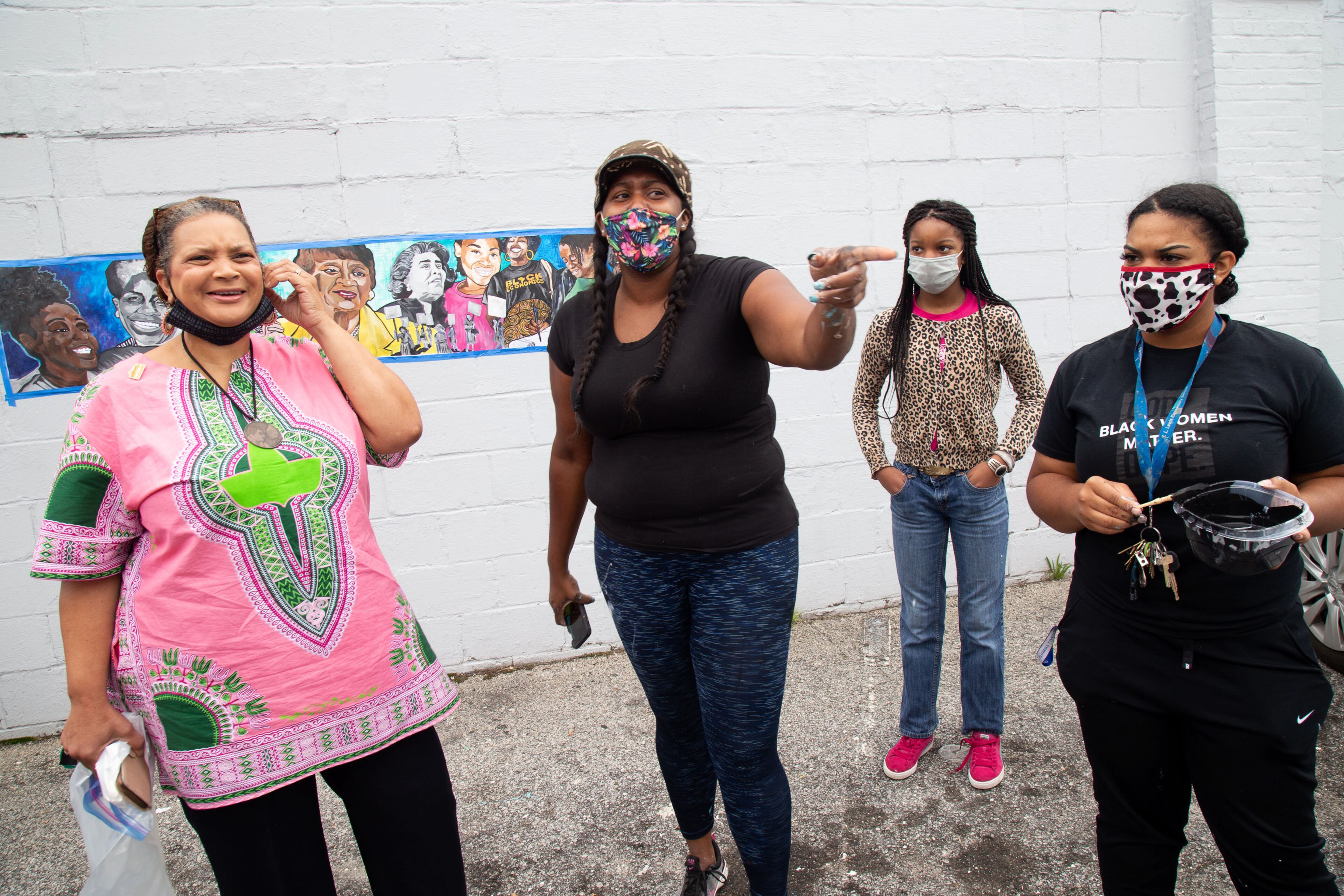
“Traditional expressions”
If Auburn Avenue was the storied nexus of Black business, then the West End, with Atlanta University Center, was the center of Black educational achievement for decades. Working- and middle-class neighborhoods sprang up around it. It is home to one of the city’s most enviable collections of 19th and 20th-century black art, at the Clark Atlanta University Art Museum. It’s where venerable Black-owned restaurants, such as the Busy Bee, served their way into civil rights history. It’s where college students, such as Cleage and Jones, began careers as bestselling authors.
“In the West End, you have Black people who are college students, street vendors, grassroots organizers, innovative entrepreneurs, Catholic school kids in uniforms, internationally known artists, historic churches,” said Jones, who grew up in the West End, attended Spelman and who sets her novels in the neighborhood. “Somebody is selling incense, or musk oil or the Final Call. I mean where, when you have a sorority thing, are you going to get your pink and green kente cloth? It has always been a resource for traditional expressions of African American culture.”
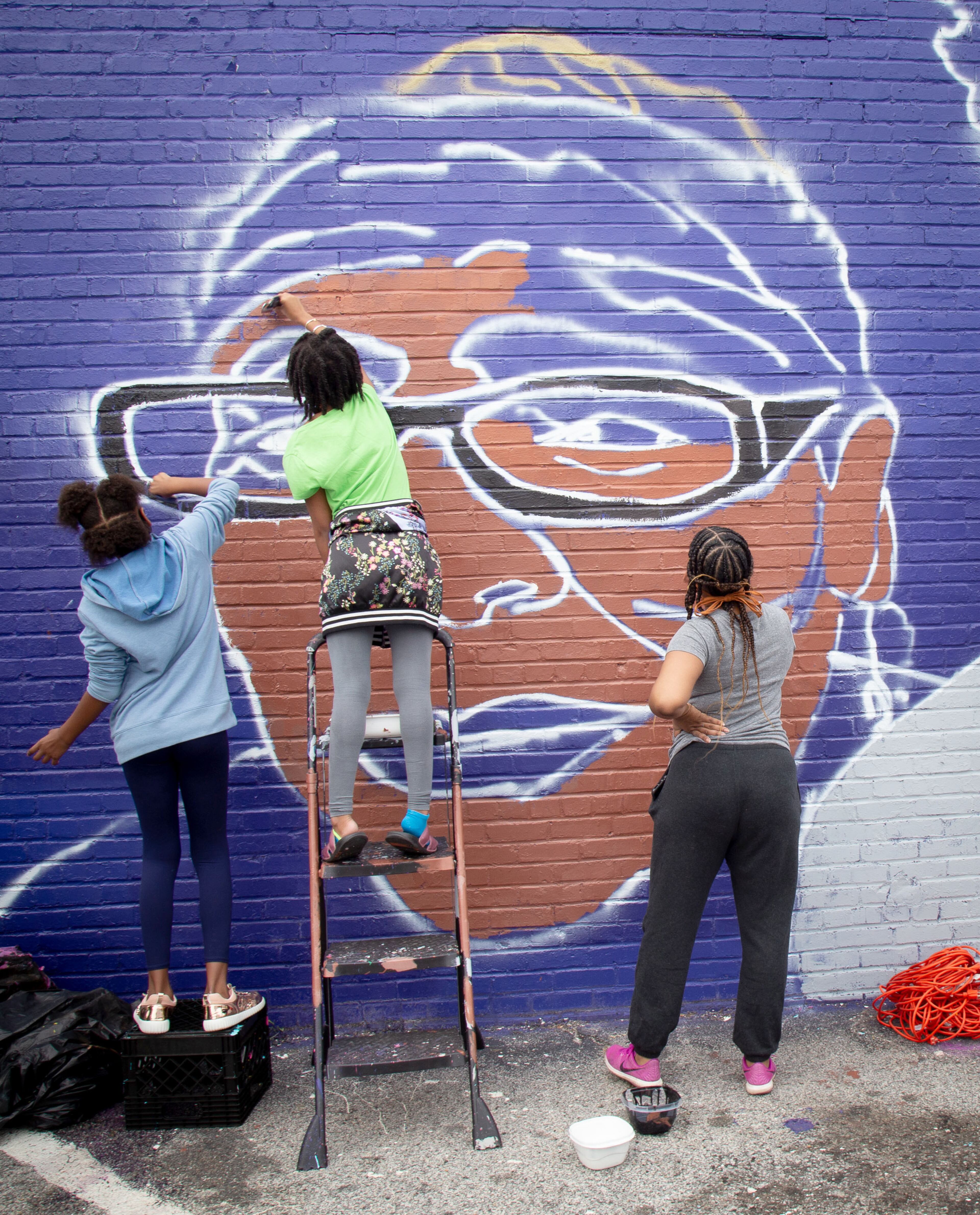
“I’ll come right back”
Those worlds came together Saturday outside the Goodwill store.
On the other side of the building, was an equally monumental mural honoring the legendary civil rights figure and West End champion, the Rev. James Orange. Designed by artist Tom Davii for the festival, the piece depicts Orange at three stages of his life. Yet, no one had tagged the piece. The omission was not lost on the women working on the east wall.
Some of the street vendors, at least one of whom was selling incense and essential oils a few feet away, told the women the taggers were upset “Heroine,” didn’t depict men, Dopson said. She said one man angrily confronted her about the omission while she worked one afternoon.
And yet, here is how things work in a tight-knit community among people who’ve known it and loved it for a long time. Rather than call authorities, volunteers asked a group of men from the neighborhood to come and watch over them as they worked. Their presence defused potential conflicts, volunteers said.
It sounded like a scene from a Cleage novel. In them, there is always a group of Black men willing to defend the West End and stand as a warning to those who’d dishonor it. Ironic, because the author is one of the women in the mural.
Sometime before daylight Saturday, the mural was tagged again. This time over a Michelle Obama quote. Deborah Scott, executive director of Georgia Stand Up, a social justice advocacy organization sponsoring the murals, was undeterred.
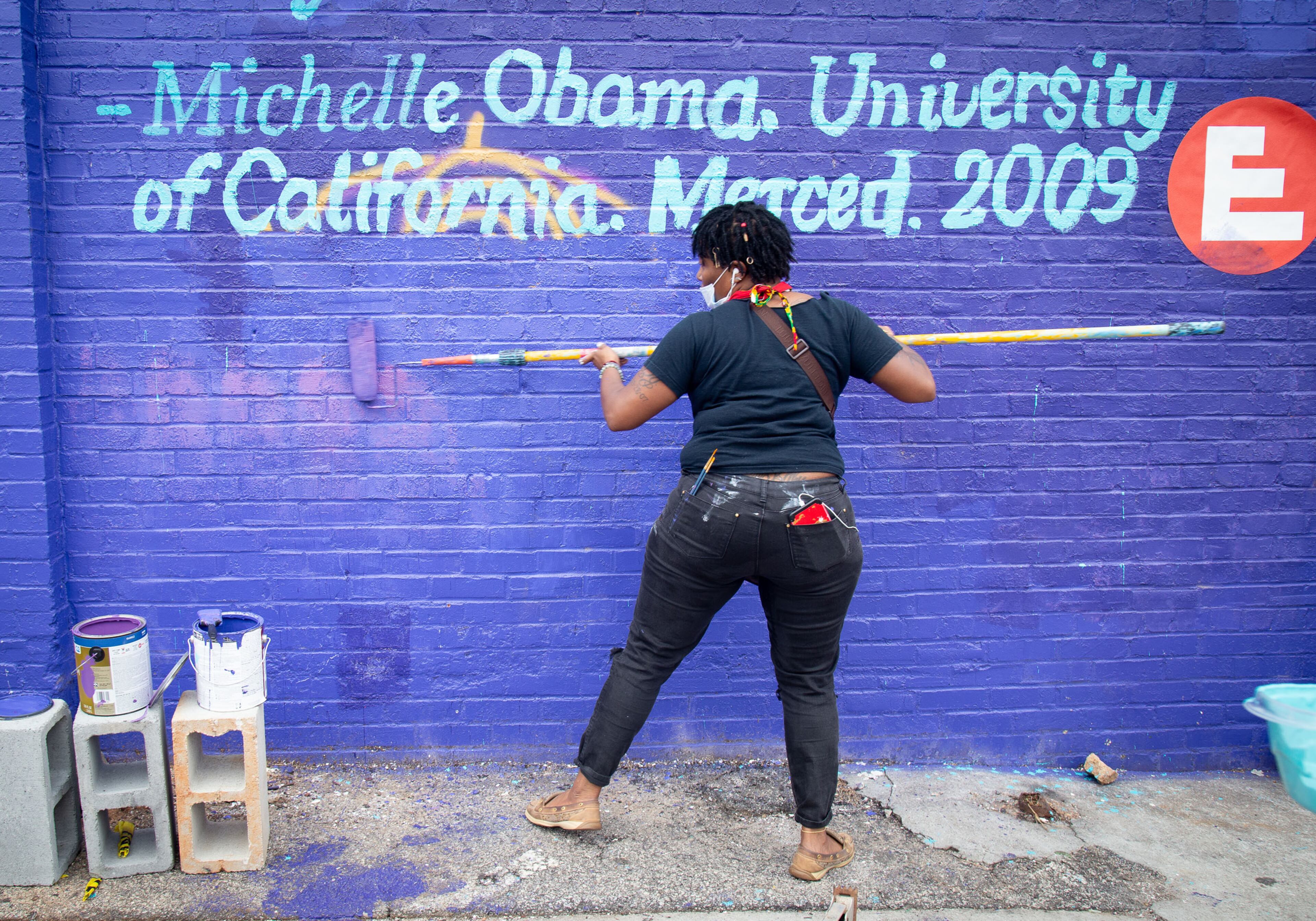
“We need to find a wall for them to paint. They need a project,” she said, wearing a dashiki of pink and green, the colors of her sorority, Alpha Kappa Alpha.
LaShebia Mayes covered the errant yellow squiggles with royal blue and turquoise paint. When rollers and brushes were too bulky for the tedious spaces, she used her fingers.
“If they do it again, I’ll come right back out here and paint again,” Mayes said.
And all around her, stroke by stroke, the heroines' faces took shape.
WHO’S WHO
The women of “Heroine: Unsung Women Involved in Civil and Social Justice,” by muralist Ashley Dopson:
Abiodun Henderson, community activist and founder of Gangstas to Growers
Hattie Guinn Watkins, mother of Willie Watkins who helped him start the Watkins Funeral Home empire
Pearl Cleage, daughter of the founder of The Shrine of the Black Madonna, a longtime West End landmark; speechwriter for Atlanta Mayor Maynard Jackson, renowned playwright and author, and Spelman College alumna
Lottie Watkins, first Black woman to become a fully licensed real estate agent in Atlanta and philanthropist to civil rights and social justice causes
Irene Dobbs Jackson, French professor at Spelman College, Maynard Jackson’s mother, and first Black person to integrate the Atlanta Public Library System
Arianna Dane Sykes, community activist
Kiyomi Rollins, entrepreneur, social and economic rights activist, owner of The Good Hair Shop and The Kenekt, a financial literacy and advocacy organization
Ayanna Gabriel, diversity and community director for the Arthur Blank Foundation, former diversity director for Teach for America, and former Westview Community President
Woody Neal Pearsons, founder of Gate City School of Excellence, educator and social advocate in the West End community for more than 30 years
EVENT PREVIEW
Elevate 2020: Equity, Activism, Engagement
Oct. 4-10
The festival will feature visual arts, cultural performances. Nearly all exhibits and events will be digital this year.


